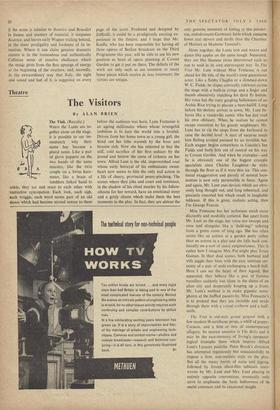Theatre
The Visitors
By ALAN
BRIEN
before the audience was born. Lynn Fontanne is an ageing millionaire whore whose revengeful ambition is to turn the world into a brothel. Driven from her home town as a young girl, she hired out her lithe warmth by the hour and became rich. Now she has returned to buy the stiff, cold sacrifice of her first seducer by the pound and bestow the curse of richness on her town. Alfred Lunt is the old, impoverished roué whose early betrayal of his enthusiastic sweet- heart now seems to him the only real action in a life of cheery, provincial penny-pinching. The scenes where they joke and court and reminisce, in the shadow of his ritual murder by his fellow- citizens for her reward, have an emotional irony and a grisly charm which make them the best moments in the play. In fact, they are almost the only genuine moments of feeling in this ponder- ous, melodramatic Germanic fable which contains fewer real shivers and thrills than the Chamber of Horrors at Madame Tussaud's Alone together, the Lunts bob and weave and -dance like apples on the same bough. Separated, they are like Siamese twins determined each to run to seed in its own extravagant way. In The Visit Mr. Lunt without Miss Fontanne is.out ahead for tlie title of the world's most pretentious actor. Like a flabby Chaplin or a slimmed-down W. C. Fields, he slopes comically sideways across the stage with a built-in cringe and a finger and thumb obsessively clutching his third fly button. His voice has the rusty gargling hollowness of an Archie Rice trying to placate a bum-bailiff. Long before his destiny arrives in town, Mr. Lunt be- haves like a vaudeville comic who has just read his own obituary. When he realises he cannot escape execution by his greedy neighbours, Mr. Lunt has to rip the stops from the keyboard to raise the decibel level. A start of surprise sends him flailing around pursued by an invisible bat. Each stagger begins somewhere in Lincoln's Inn Fields and hurls him out of control on his way to Covent Garden. And when he crumples—and he is obviously one of the biggest crumple specialists since Charles Laughton—he sinks through the floor as if it were thin ice. This con- tinual exaggeration and parody of normal loco- motion is now only permissible in farce. Again and again, Mr. Lunt uses devices which are obvi- ously long thought out, and long rehearsed, and precisely executed but which result in laughable tableaux. If this is great, realistic acting, then I'm George Fearon.
Miss Fontanne has her technique much more discreetly and modishly corseted. But apart from Mr. Lunt on the stage, her voice too swoops and coos and elongates like a `dahl-ing!' echoing from a green room of long ago. She too often seems like an actress at a garden party rather than an actress in a play and she falls back con- tinually on a sort of saucy enigmaticness. This is rather how I imagine Mrs. Pat might play Texas Guinan. In their dual scenes, both husband and wife juggle their lines with the easy intimate cer- tainty of a pair of seals exchanging a beach ball. Here I can see the heart of their legend. But separated, they behave like a pair of famous travellers suddenly lost alone in the slums of an alien city and desperately keeping up a front.
Mr. Lunt's method is to make gigantic sema- phores at the baffled passers-by. Miss Fontanne's is to pretend that they are invisible and stride through them with a raised eyebrow and a half- smile.
The Visit is old-style grand guignol with a few modern H-certificate props, a whiff of poppy- Cocteau, and a hint or two of contemporary allegory. Its nearest ancestor is The Bells and it may be the race-memory of irving's campano- logical triumphs there which inspires Alfred Lunt's Lyceum pastiche. Peter Brook's direction has attempted ingeniously but unsuccessfully to impose a firm, non-realistic style on the play.
But all the messy bursts of noise and jigging, followed by frozen silent-film tableaux inter- woven by Mr. Lunt and Mrs. Lunt playing in entirely opposite conventions, eventually only serve to emphasise the basic hollowness of its social comment and its emotional insight.


























































 Previous page
Previous page